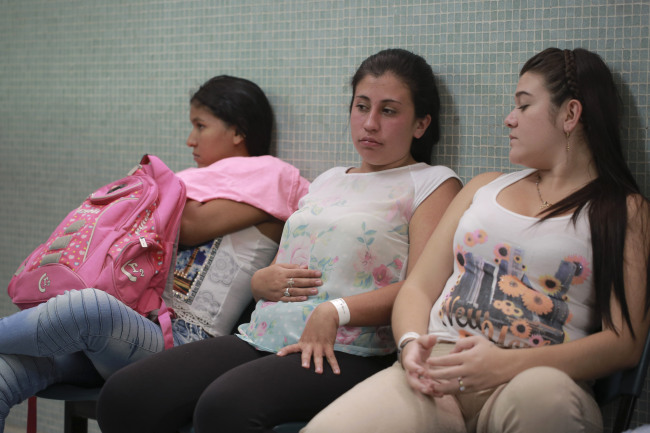Debate is brewing over whether or not South Korea should loosen its abortion laws to allow the procedure for Zika-affected pregnant women should there be an outbreak of the virus in the country.
The Zika virus, which is transmitted through an infected mosquito, has been claimed to be linked to cases of microcephaly, in which babies are born with abnormally small heads and underdeveloped brains. Earlier this month, the World Health Organization issued a worldwide warning that the virus is a global health emergency that requires a unified response. No confirmed case of Zika has been reported in South Korea, as of Tuesday.
Throughout the last few weeks, a number of questions were asked during press meetings on whether or not the Health Ministry would allow abortions for pregnant women who have been infected with Zika, in the event of an outbreak of the disease here.
The Zika virus, which is transmitted through an infected mosquito, has been claimed to be linked to cases of microcephaly, in which babies are born with abnormally small heads and underdeveloped brains. Earlier this month, the World Health Organization issued a worldwide warning that the virus is a global health emergency that requires a unified response. No confirmed case of Zika has been reported in South Korea, as of Tuesday.
Throughout the last few weeks, a number of questions were asked during press meetings on whether or not the Health Ministry would allow abortions for pregnant women who have been infected with Zika, in the event of an outbreak of the disease here.

“I believe it is currently considered illegal, and there should be more debates on the issue to come up with plans,” said Kwon Ja-young, an associate professor of gynecology at Yonsei University College of Medicine, at a recent press meeting with reporters at the government complex in central Seoul.
Abortion is legally prohibited in South Korea except in certain circumstances, such as when the woman was impregnated by rape, when the woman or her partner suffers from any contagious disease, and when the maintenance of pregnancy could severely injure the health of the pregnant woman for medical reasons.
Article 15 of the current Mother and Child Health Act of South Korea states that an induced abortion operation may be performed due to infectious diseases such as German measles, toxoplasmosis and “other diseases which medically expose embryos to high risk.”
However, all abortions -- no matter the circumstances -- are illegal in South Korea, after the first 24 weeks of pregnancy.
Choi Suk-joo, a gynecologist at Samsung Medical Center in Seoul, said it may be too early to talk about law revisions as the suspected link between the Zika virus and microcephaly have yet to be proven. He also stressed that microcephaly is also caused by a number of different conditions and situations apart from Zika, such as chromosomal abnormalities and decreased oxygen to the fetal brain during pregnancy or delivery.
“I think the law revision can be very difficult to tackle,” he told The Korea Herald. “The current law prohibits abortion after the first 24 weeks of pregnancy, no matter what the circumstance are. So what are they going to do about pregnant women who get diagnosed with Zika after the first 24 weeks? How are they going to prove that the fetus’s microcephaly was caused by Zika?”
The Health Ministry and the Korea Centers for Disease Control and Prevention said they are currently unable to comment on the possible legal revision.
Fear is growing among Korean pregnant women in and those who plan to become pregnant, after the KCDC issued a warning last month to discourage travelers from visiting Zika-affected countries.
Kim Su-yeon (not her real name), a 29-year-old office worker in Seoul, recently cancelled her honeymoon to Mexico in order to avoid possible Zika infection. “I would have still gone (in spite of the outbreak) if it was not a honeymoon and just a trip with friends,” she said.
Some countries in Latin America, where Zika has hit the hardest, have responded to the crisis by encouraging women to postpone pregnancies. In the region, among the countries where Zika cases have been confirmed, only Guyana and French Guiana allow abortion without restriction. Meanwhile, a group of Brazilian activists, scientists and lawyers have asked their highest court to permit abortions for women who have contracted the virus.
Latin America is home to more than 425 million Catholics – the church does not accept birth control or abortion. Nearly 40 percent of the world’s Catholic population.
In response to the mounting health crisis in the region, Pope Francis said contraceptives may be used to prevent Zika infection, while still calling abortion an “absolute evil” and a “crime” at a press conference aboard a return flight from Mexico to Rome last week.
The WHO said earlier this month that the link between the Zika virus and birth defects can be confirmed within weeks.
By Claire Lee (dyc@heraldcorp.com)










![[Today’s K-pop] BTS pop-up event to come to Seoul](http://res.heraldm.com/phpwas/restmb_idxmake.php?idx=644&simg=/content/image/2024/04/17/20240417050734_0.jpg&u=)





![[KH Explains] Hyundai's full hybrid edge to pay off amid slow transition to pure EVs](http://res.heraldm.com/phpwas/restmb_idxmake.php?idx=652&simg=/content/image/2024/04/18/20240418050645_0.jpg&u=20240419100350)

